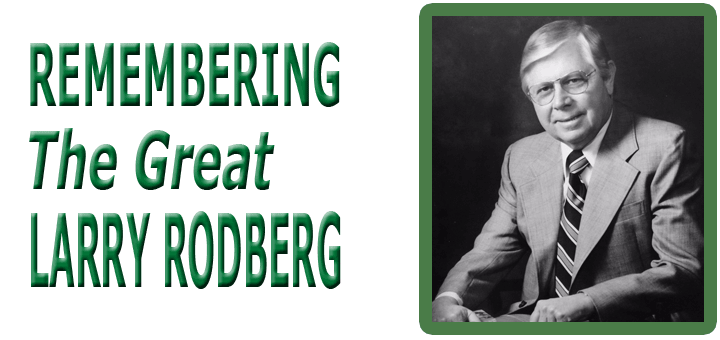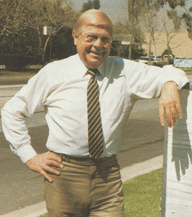
Richard Malkin, the man
who invented modern air cargo journalism, has breakfast with me in a diner
near his home in Queens every two weeks.
Nearing 101 years old, Malkin is writing
again; here is a link to the most recent story that we published.
Recently at breakfast I told him we were
coming to AirCargo 2014 in Orlando to honor Bill Boesch, and he said that
was good, but then asked me:
“What about Larry Rodberg?”
I asked him right back, so what about (the
late) Larry Rodberg?
Then Dick told me a story of how Larry built
a company called Burlington Northern Air Freight into a big success and
wanted to give back, and Malkin told Larry to use his smarts and money
to get involved with the nearly defunct Airforwarders Asssociation.
“Pick them up, and help the entire
air cargo business, I told Larry,” Malkin said.
“At the time AfA was on the rocks;
its founders—who had been in place since the end of WWII—had
just grown old and moved on as interest in the organization waned,”
Malkin said.
So that is exactly what Larry did, revealing
himself as a giving person who was not only satisfied with his company’s
success.
 Larry believed that air cargo could grow
and flourish with the critical help of an organization that would present
the unique advantages of air cargo—speed, reliability, on-time delivery,
and minimal headaches.
Larry believed that air cargo could grow
and flourish with the critical help of an organization that would present
the unique advantages of air cargo—speed, reliability, on-time delivery,
and minimal headaches.
“In unity, there is strength,”
was Larry’s motto.
Larry and a few like-minded forwarder executives
set out to change the AfA, from talking in a whisper to a voice that could
be heard loud and clear to shippers, airlines, and in the halls of Congress.
Spending a great deal of time and effort,
and serving as President of AfA four times, Larry achieved his goal.
The AfA voice grew more assertive over the
years until today, led by Brandon Fried, Executive Director, (left) it
competes successfully among transportation organizations representing
older, larger—and much richer—industries such as railroad,
trucking, and ocean shipping.
While striving to fashion a renewed, active,
and vigorous AfA, Larry never forgot his roots as a working forwarder.
Built
Burlington Northern Air Freight Inc.
BNAFI was founded soon after the CAB, which
ruled the civil aviation industry in the 1970s, allowed railroads to own
air freight forwarders.
One railroad executive saw almost immediately
the possibilities of air freight forwarding ownership.
He was Norman Laurentzen, president of Burlington Northern Railroad.
Laurentzen thought an air cargo division
would add another service to the railroad and hopefully earn a profit.
But who effectively could start and operate
this new Burlington division?
Laurentzen was told about Larry Rodberg,
a dynamic sales exec then working for Airborne Freight.
He invited Larry to a meeting at the railroad’s St. Paul, MN, headquarters.
Together with an associate, George Ryan,
Larry flew to St. Paul from Airborne’s Seattle office.
Larry was not the typically elaborate business
plan guy, with power point presentations and pointer in hand.
The night before the meeting, in their hotel
rooms, Larry and George scribbled notes on little yellow post-it notes.
The next morning, they marched into Laurentzen’s
office with a commitment for a new forwarding company. It was to be called
Burlington Northern Air Freight.
They marched out with a $2 million commitment
to fund the new division—chump change for the railroad.
Larry was on his way and never looked back.
He and George took offices in Newport Beach
and began looking for personnel. Larry hired the best he could find.
He opened company-owned and operated offices
in key cities of the U.S. No franchises for him.
Zero To Hero
From a zero start, BNAFI quickly became
one of the largest and most successful forwarders in our business.
Its substantial return on investment and
yields of 20 to 25 percent brought joy to St. Paul.
These figures are unimaginable today. Within
18 months, the $2 million loan was repaid in full.
Marketing & Sales Extraordinaire!
Larry was not just a born salesman. He also
was no slouch at marketing.
Larry wanted a slogan that would sum up,
in a few words, the core of air freight.
He asked his marketing people to come up
with a phrase that would encapsulate the qualities of air freight.
One of his advertising people created the
slogan that still is in use today.
“People, not planes deliver.”
Fleets To
Futility
 A
little rain must fall in every success story, however. A
little rain must fall in every success story, however.
The rain fell heavily on Larry.
Turning once more to the air freight business,
shortly before its demise the CAB decreed that forwarders could fly their
own airplanes.
The largest forwarders like Emery and Airborne
rushed to buy or lease older aircraft.
New management at now BAX Air Express also
wanted to get on the air force bandwagon.
Larry fought the new owners bitterly.
He was no Luddite, but believed a forwarder
could prosper only as a classic, non-asset middleman between shipper and
airline.
A forwarder’s value to his customer
was the ability to go anywhere any time—to the next city or the
furthest overseas destination.
Larry lost the battle, but won the war.
Today, no forwarder owns an air fleet.
As John Emery, Jr., once told this reporter,
“running an airline at Emery was the greatest mistake I ever made.
“Let the airlines bleed red ink,”
Emery said.
Remembering
Larry
Today, Larry, who died in 1990 of leukemia
in Newport Beach, California, at the young age of 68, should be honored
and remembered not only for creating a very successful company, but, perhaps
more importantly, for instilling in the forwarding industry a sense of
confidence about who they are, and for making the public aware of it through
the Airforwarders Association.
Some stories and people should live forever.
Geoffrey
|


